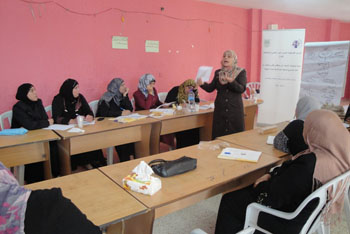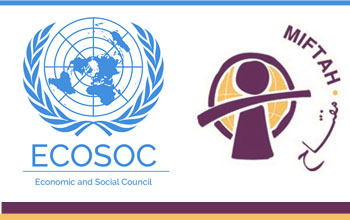
Ramallah – Immediately after Mahasen Mohammed from Biddu, a village northwest of Jerusalem, finished her university degree in education at Al Quds Open University, she enrolled in a training program carried out by MIFTAH as part of its ‘Empowerment of women through grants for income generating projects in rural areas.” The training program was under the supervision of Hanan Saeed, the project coordinator, while the training was carried out by Ibtisam Bader, an expert in the field of project management.
Mahasen admits she was encouraged to enroll in the training by Mufida Hmeidan, director of the women’s center in Biddu where Mahasen works. “I went to see the director, Um Ismail and she proposed that I apply for a project from MIFTAH from which I would get support that would secure a better life for me and my fellow colleagues,” Mahasen explains.
Mahasen says she and four other women applied for a pastry-projection project. “We want to make spinach pies, cheese pastries and sweets,” she says, “and cater to customers inside the village.” The biggest incentive to her was that this would provide an income for her and her colleagues and would not interfere with their other responsibilities at home. “Not to mention that this is an opportunity to leave our houses and break the daily routine that so many of the women endure,” she added.
While Mahasen recognizes that she is a university graduate, she admits that the training she received from MIFTAH on food production provided her with important knowhow as to ways of marketing products and how to deal with customers and even how to create detailed budgets for the project.
Mahasen says she will not stop at making pastries, though. She aspires, along with her partners, to plant spinach as well, and from that produce, make her pastries and pies. This way, she says, they will not have to buy from the market and can harvest the land.
For this reason, Mahasen is looking to get more help and support from MIFTAH to develop her projects. She is confident that this will happen. “MIFTAH does not leave anyone behind. It helps everyone,” she says, adding that she hopes the scope of MIFTAH’s support will branch out to more women in the area northwest of Jerusalem .
Jamalat Daoud from the village of Beit Dukko, also a village northwest of Jerusalem is a housewife and mother of five children, the oldest 17 and the youngest eight.
Jamalat is a board of director member of the Beit Dukko society for development. She owns and runs a small grocery in the village and is one of the women who applied for a food-production project to MIFTAH, from which five women would benefit.
Jamalat immediately enrolled in MIFTAH’s training, believing that before one can develop any sort of project, they first have to develop themselves , their knowledge and capabilities for any project or action to succeed. The training offered her valuable information in project management, studying budgets and ways to treat customers and clients.
While Jamalat understands the importance of supporting collective projects, she also feels it is important to support individual ones as well. “Why can’t we give individuals the chance to get the same support, especially people who are accustomed to applying for loans and who mostly do not turn the desirable profits from their projects.”
At present, Jamalat along with a group of women, is trying to obtain a license from the Beit Karma Cooperative in order to implement more projects needed in the region. She is hoping to soon begin her project submitted to MIFTAH.
The two-day training was carried out by project management expert Ibtisam Bader. She says that the training addressed several issues such as: marketing, economic feasibility, project financing and mechanisms for success, all of which are basic requirements for getting support and help from MIFTAH. Two projects were on the table: one for food-production and the other for animal husbandry. Badr says one of the key points the training wanted to get across to the women was the soundness of their project ideas, and the ability for their sustainability.
Hanan Saeed, project manager of the “Empowerment of women through grants for income generating projects” pointed out that this MIFTAH project is funded by the Arab Fund and is aimed at offering small projects to women in order to improve their financial situation and to empower them economically and socially. Ultimately, the project is aimed at enabling these women to become leaders in society. The women, Hanan says, are between the ages of 38 and 50 and are chosen according to their ability to work within projects of their choosing. After the project is completed, MIFTAH continues to follow up with them over a period of two years.
Hanan points out that the choice of villages northwest of Jerusalem and the Jordan Valley areas was not arbitrary, explaining that these areas are marginalized and at risk; they suffer poverty and poor economic conditions. Their residents endure Israeli measures such as land confiscation, displacement and expulsion, namely in the Jordan Valley. She says that once the project is up and running, the total number of beneficiaries in both areas will reach 67 women.






